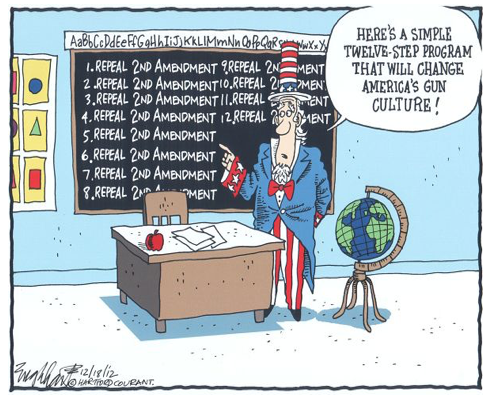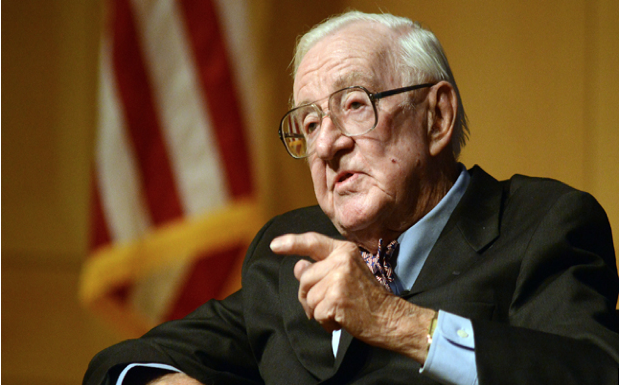CommentsGELFAND’S WORLD-It is interesting that John Paul Stevens, a retired Justice of the Supreme Court, has just published an essay calling for the repeal of the Second Amendment. Just like the fact that the term democratic socialism isn't scary to the younger generation, there are -- suddenly -- a few calls for amending the Constitution in this way. Perhaps the idea doesn't scare the younger generation because the prospect of being murdered during second period English scares them more.
***
One clue that calls for repealing the Second Amendment are gaining traction is the alarmed response by Robert A. Levy of the Cato Institute in a CNN editorial. This country hasn't really been talking  about repealing any part of the Bill of Rights since the communist scares of the 1950s (pundits sometimes referred to "fifth amendment communists"). I suspect that the Stevens call for repeal won't have a lot of traction immediately, but if the mass shootings continue, there will be a slow buildup in pro-repeal sentiment. This sort of thing is measured in decades -- do we imagine that this country will still be putting up with mass murders a century from now? Even 50 years from now?
about repealing any part of the Bill of Rights since the communist scares of the 1950s (pundits sometimes referred to "fifth amendment communists"). I suspect that the Stevens call for repeal won't have a lot of traction immediately, but if the mass shootings continue, there will be a slow buildup in pro-repeal sentiment. This sort of thing is measured in decades -- do we imagine that this country will still be putting up with mass murders a century from now? Even 50 years from now?
***
Of course it would require a two-thirds vote in both houses of congress to put a repeal amendment before the states, but remember that a simple majority of voters in two-thirds of the congressional districts and in two-thirds of the Senate races is all it would take to develop those two-thirds votes in the congress.
***
It's not surprising that my article (and lots of other articles) about the March For Our Lives got comments both pro and con. To those who quote patriots from the American revolution, I think it is acceptable to point out that in those days, armaments of a personal nature were not capable of killing dozens of people in a few seconds. Cannons were another matter, but they were used by armies, not in tavern brawls. There is an old saying that the Constitution is many things, but one thing it is not is a suicide pact. It's hard to imagine that the founders would have agreed with the notion that any individual can own a weapon capable of doing so much killing in so short a time. Can you imagine Benjamin Rush or George Washington or the aging Benjamin Franklin approving of such a thing?
It's true that the founders did not say "the right to keep and bear muzzle loading single shot weapons shall not be infringed," but that is how the passage should be understood. That is what a personal arm was at that time. There were also swords and daggers, neither of which was capable of killing people by the score in a few moments. If conservatives want to adopt a posture of Constitutional originalism, than they ought to consider what the term "arms" meant at the time the Bill of Rights was passed.
***
The Second Amendment fundamentalists might want to consider how their extremism is pushing people in the opposite direction. A more studied approach might allow for a lesser remedy. That more studied approach would involve the acceptance of gun regulation as a necessity. In other words, the NRA and gun enthusiasts might want to consider the limits to which they can push the political window.
***
A change in topics: The following is Chapter 5 in the ongoing saga of the neighborhood council Funding Equity Working Group. Feel free to skip it if this topic doesn't interest you, but there is some amusement in the saga. My conclusion is that the city should disband this group.
***
Let's start with a one sentence review of a couple of previous columns: The problem facing the neighborhood council system this year is that you can be a council with fewer than four thousand residents or you can be a council of nearly a hundred thousand, but you both get the same amount of money from the city.
***
To some people, this seems unfair. The current stipend is $42,000 per year for each council, whether you are Hermon Neighborhood Council (four thousand residents) or Koreatown (nearly a hundred thousand residents). So the Board of Neighborhood Commissioners (BONC) created a panel called the Funding Equity Working Group to come up with a recommendation. If I'm guessing correctly, the working group was supposed to recommend some modification that would reduce the stipends for the smallest councils and perhaps increase the stipends to the largest councils. In other words, the Funding Equity Working Group was created in order to provide cover for a new policy that would annoy some of the smaller councils.
Still, the panel's work should have been a slam dunk -- fifteen minutes defining the question and maybe another hour doing the fine tuning. The smallest council should get maybe $5000 a year. The largest councils should get something like $60,000. If somebody cares to make a stronger case for the larger councils, perhaps they ought to be funded at $80,000. There aren't that many of them and this level of funding (a dollar per resident per year) would be fair.
***
But four long meetings went by, and the Working Group was still arguing the guiding principles. They have agreed in principle to recommend that funding include a baseline number plus an additional amount proportional to population, but they did not agree to specific numbers. Most proposals are thinly veiled protections of the status quo, with perhaps a modest reduction in payment to the very smallest councils. Some proposals don't even go that far.
***
On Tuesday, March 27, the FE group came down to San Pedro for its 5th meeting. Well, 15 of the 24 members came down. It hardly mattered that some were missing, because the discussion was a rehash of the same stuff that had been gone over previously. One of my colleagues left early, and out in the hallway muttered to me, "It's like Groundhog Day." True, except that we were all Bill Murray in this version.
After the meeting was over, one of the appointed panelists said to me, "It's Groundhog Day" -- this without knowing that another person had come up with exactly the same metaphor.
There were long speeches about what principles ought to be followed (they couldn't figure this out in meetings one through four?) and about the tough decision they would have to make. But no decisions at meeting number 5 -- not that night. Maybe in the next meeting or the one after that. In other words, the fifth meeting was a meeting to discuss calling another meeting.
***
Several members of the group are still obsessed with the fear that lots of smaller neighborhood councils will break off from the larger councils under the city's new, more liberal rules. The fear is that the new councils will drain money from the original councils. This is seriously to miss the point.
***
The point of course is the following: What are neighborhood councils for? If the answer is for neighbors to come together to discuss their mutual concerns, then subdividing into small, cohesive groups is a desirable outcome. We should be able to accomplish this without funding such groups at princely levels.
***
Let's go for seven meetings now.
The Funding Equity group is now asking to have a couple more meetings. They couldn't do their job in five meetings (totaling more than a dozen hours of debate and posturing). May I suggest to the BONC that it should put an end to this misery by dissolving the Funding Equity Working Group.
***
Here is an alternative approach. How about a few of us coming up with our own suggested replacements for the current funding system. There is only one rule -- a) Two paragraphs maximum, and b) no more than 400 words. Send them to me if you like.
(Bob Gelfand writes on science, culture, and politics for CityWatch. He can be reached at [email protected])
-cw

















